
Headmaster's Reflections
Headmaster
Dr Alec O'Connell

Headmaster
Dr Alec O'Connell
Welcome back to Autumn Term. It is not quite what many of us would have envisaged at the start of 2020, but nevertheless, here we are facing a very different start to the term.
Firstly, can I extend my sincere thanks to our boys, their families and of course, their teachers for navigating us all through the last two weeks of Summer Term and the first week of Autumn Term via our SCOT programme. While I am aware there may be elements that can be developed and improved, the on-balance feedback has been extremely positive. Thank you for your notes of support and suggestions for improvement.
So now we recommence our face-to-face teaching journey. The transition back to face-to-face will also have moments of challenge, especially for those families who have decided to keep their son(s) at home. Our survey results indicate that our return to school percentage is 90+, but this week’s attendance records will confirm the reality. While for the majority of student face-to-face classes may be commencing again, there are still many other matters requiring consideration before we return to full operational normality.
One of the major challenges over recent weeks has been some of the confusing public messaging. We must remember that each school has its own set of unique circumstances and Scotch is no different. We will continue to navigate our way forward based on well-thought out processes, available information and what we feel is best for our community. If you hear anything that is of concern to you, or does not make sense, please speak to the College for clarification regarding our position, not that of another school.
Over my time at Scotch, I have often referred to the fact that without our students, staff and our wider support network, Scotch is simply a collection of great facilities in a beautiful suburb. So, as today marks the start of returning to some normalcy as a school community, let us not become complacent.
I urge families to encourage their son(s) to continue to exercise high levels of hygiene and sensible social distancing in their day-to-day interactions with each other and the adults to which they come into contact with, especially their teachers. A priority for me is the ongoing health and safety of our staff who have returned to teach or support our boys through their role at the College. With this in mind, I ask for your support through avoiding any unnecessary entry onto campus by parents or any other adults not employed directly in the operation of the College. The return to school is a major step in relaxing community restrictions, but we still need to approach this time with measured optimism, not complacent exuberance.
Once again thank you so much for supporting the College with the challenges we have faced thus far and for the support you will continue to give us as we journey through this COVID-19 environment together.
If you have any queries or concerns, please contact your respective sub school directly.
Have a great fortnight.
Dr A J O’Connell
Headmaster
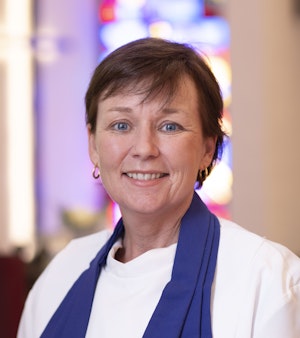
Revd Justine Wall
Chaplain
In 1927 a group of returned men returning at dawn from an Anzac Day function held the night before came upon an elderly woman laying flowers at the as yet unfinished Sydney Cenotaph. Joining her in this private remembrance, the men later resolved to institute a dawn service the following year. Some 150 people gathered at the Cenotaph in 1928 for a wreath-laying and two minutes' silence. This is generally regarded as the beginning of organised dawn services.
Source: Australian War Memorial
The first Anzac Day dawn service was a simple affair. A small group of returned servicemen keeping vigil with an old woman laying flowers at an unfinished war memorial. For many years afterwards, returned servicemen, grieving widows and children gathered locally, laid flowers, lit candles and prayed in silence. There were no loudspeakers, national anthems, flags or bugles. Simply a light in the darkness and silent fellowship.
Almost a century later, at the height of the Corona virus pandemic, Australians and New Zealanders kept a simple vigil once again. At 6am on the 25th April people emerged from their homes into the darkness with bright candles and copies of the Ode in hand and joined in the silent fellowship. In a world unrecognisable to the original Anzacs, people still remember and give thanks for the sacrifices of men and women who serve their country.
Amongst those keeping the dawn vigil this year were many Scotch boys. Photographs of them in school uniform, some wearing family medals, are included in our online assemblies this week.
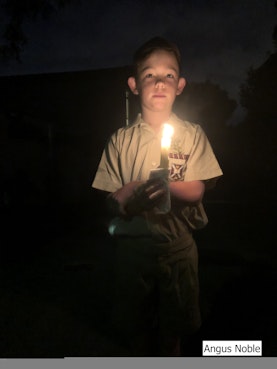
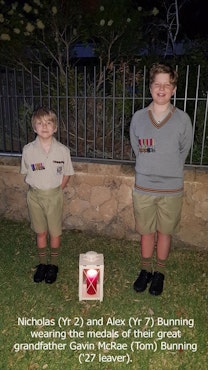

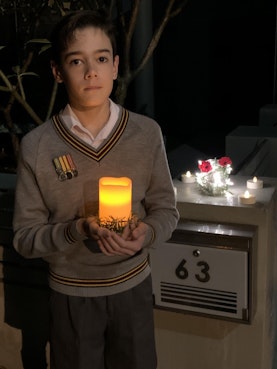

Mrs Cara Fugill
Director of Teaching and Learning
Through personal experience, I empathise with the challenges that parents have faced over the past month as they juggled work, entertainment, household duties and education for the entire family in the confines of their home. There is no doubt that even though the move to online teaching was handled exceptionally well by our community, there would have been moments of family frustration when we all dealt with regular interruptions as the facets of our lives came crashing together. As a parent, I personally felt a 'small' sigh of relief as the announcement came from the Headmaster that students would be returning to school on Monday and there was a similar response from my children, who could not wait to see their friends, teachers and play on those magical Scotch ovals once again. Watching their online learning journey and seeing the creativity of staff who have made their lessons relevant and engaging has been joyous to observe and, similarly, I have been astounded to see how independent they can be at monitoring their learning, particularly when they realised their standard of work was being supervised and they were receiving regular feedback.
However, no matter how comparable the system for online teaching was to the classroom experience, the routine of coming to school, engaging with the community face-to-face and sharing our daily lives with each other is what makes this school thrive. A school feels unusually empty without the heart and soul of the place, our young people, and it is a salient reminder of the importance of having that regular human contact.
Likewise, much of the complex learning that occurs in the classroom sits above the knowledge curriculum and is best developed in our students through interaction. Learning from our teachers or peers, by observing the way people respond to us or what they are willing to share of themselves, is important for the development of our human qualities. We have to observe in order to emulate, master and then teach these skills to others. These cognitive skills such as sustained attention, flexible thinking, information processing and pattern recognition are best challenged in a classroom environment and although in the confines of our home we may learn uninterrupted, it is the complexity of learning in these stimulating environments that challenges us and develops the adolescent brain. Through Teams and other social forums, we hoped to provide elements of this, however, we are thoroughly looking forward to returning to a more natural way of interacting and working hard on challenging all aspects of our children's learning.
Whilst some members of our community must continue in these unusual circumstances, I want to wish them the very best and hope that they are able to return to school as soon as possible. As a school, we will continue to support these young people from afar and will work hard to ensure they continue to play an important role in the Scotch community.

Mr James Hindle
Director of Student and Staff Wellbeing
Just like trees do, as we grow up, we must put roots down. We need something which can support and anchor us; when conditions are against us, we need something to hold us in place. The taller we grow, the stronger the root system required to hold us in place. What is interesting is that there are two sorts of trees – those who put down deep tap roots, and those that have a shallow but widespread root system.
Redwoods are from the latter group. These are amazing trees – they grow up to 115 metres tall, have a diameter of around eight metres and they live for around 1500 years. Their bark can be 30cm thick. And yet, for some of the oldest and biggest living things on the planet, their roots are relatively shallow. There is no tap root to anchor them deep into the earth. The roots actually only go down two to four metres, and yet, these trees rarely fall over. They withstand strong winds, earthquakes, fires, storms, and prolonged flooding. How can something weighing over 400 tonnes , reaching over 100 metres in height, and living for many centuries, remain standing with roots only going down about three metres ?
The answer is that their root system is intertwined with the root systems of neighbouring Redwood trees; they literally hold each other up. The trees grow relatively close together and are dependent on each other for nutrients. They form a kind of subterranean tartan with their roots, crisscrossing and interlocking across a wide area, so that they support each other and this, combined with their proximity, makes them much harder to blow over.
Wolves are amazing creatures. I watched part of a documentary on them a while ago and it seems that they have been very harshly dealt with by the Brothers Grimm and other fairytale writers. Wolves howl when a member of the pack is removed – perhaps not such stunning news to many. But I never realised that there is one wolf which howls louder and longer than the others when another wolf is removed; they have a buddy system. When their buddy is removed, a wolf will call louder and longer so that the removed wolf can find its way back to the pack. Even stranger, when a bowl of food is put down between two wolves, they will share it without fighting, even when one is the pack leader and the other is a junior member. With other dogs, and dare I say with many people, where there is a dominant dog, that dog will eat all the food and the junior dog knows to keep its distance.
At our best, human beings behave in ways that mirror these examples from the natural world. A simple yet beautiful example was the way so many Australians turned out on Anzac Day to stand silently in their driveways at dawn. On that morning, I was fortunate to raise the flag at school and lower it to half-mast as various versions of the Last Post floated their way across the suburb. Driveway vigils are representative of that link which binds us together and a symbol of the respect people have for our past. It is a sign of gratitude for what we have, even in difficult times.
The human capacities to care and support have been on display so often in these past weeks, and yet the examples we see should be reminders, exhortations even, to each of us to do what we can. Perhaps this is the best thing we can do for our children in times like this. A close second is to be compassionate wherever possible – to ourselves as well as others.
We have our own amazing tartan network operating just beneath the surface of life here at Scotch, made up of so many people who are connected by their willingness to support your child and help to provide stability, not just now, but always. If you are concerned about your child at any stage, please let us know sooner rather than later. As a first point of contact, you can speak to your child's classroom teacher in Junior School, their Homeroom teacher in Middle School, or their House Head in Senior School. You can also speak to one of our School Psychologists – Shauna Lipscombe or Jon Marginis in the Senior School; Kim Lorimer in the Middle School; and Jon Marginis in the Junior School.
Boys need to be in winter uniform on Monday 25th May.
As part of our COVID-19 response, the uniform shop continues to be available online only. Items can be ordered online and posted to you, or collected from the uniform shop during the following times:
Tuesday: 10.00am to 11.00am, 3.30pm to 5.00pm
Thursday and Friday: 10.00am to 11.00am
Online shopping is available via http://www.flexischools.com.au payment is by credit card or PAYPAL.
Fittings for winter uniform can be booked online. Please see the uniform shop webpage for details as well as to book your appointment: https://home.scotch.wa.edu.au/services/uniform

Miss Penny Hooper
Acting Head of Junior School
During the second week of the holiday break, Rev Justine Wall sent a notice to ‘Light up the dawn at 6.00am on Anzac Day’ to all our Junior School families. In the words of the Minister for Veterans’ Affairs, Darren Chester, “Anzac Day is when Australia comes together to recognise all those who have served our nation and pay tribute to the sacrifice of more than 102,000 Australians who have given their lives in the service of our country,”. So, to pay tribute to the ANZACs on our return to school, the Junior School will acknowledge the sacrifice of our soldiers through a small digital ceremony.
Having had the privilege of visiting Gallipoli, and as a proud Australian, I have stood on the very soil where so many souls lost their lives. It is hard to put into words what that experience was like. It was a sombre, quiet and reflective place, as are so many places across the world where you know that many lives were lost in the face of war and it is something that is hard to possibly imagine.
I distinctly remember seeing the shrapnel holes in the cliff faces on the beach front and wondering how on earth it was even possible to get from the beach, across the sand and up the cliff face. It was a remarkable feat for those who did make it and extremely costly to those who tried and failed. I stood right next to what were the remnants of the trenches and saw firsthand the barbed wire, the wooden struts and broken posts which was a very sobering moment. I tried to piece together the horror that these young men would have been confronted with and what would have been total desperation to just stay alive in order to return home to their families.
Taking the time to visit the well-known locations like The Nek, Lone Pine, Shrapnel Valley and Anzac Cove allowed me the opportunity to pay my respects to those who had fallen. Atatürk, who was a commander of the Ottoman forces at the Dardenelles during the first world war, wrote a lovely tribute and acknowledged the mothers whose sons did not come home. These are his words and they stand large on the grounds at Gallipoli:
“Those heroes that shed their blood and lost their lives… You are now lying in the soil of a friendly country. Therefore, rest in peace. There is no difference between the Johnnies and the Mehmets to us where they lie side by side in this country of ours. You, the mothers, who sent their sons from far away countries, wipe away your tears. Your sons are now lying in our bosom and are in peace. After having lost their lives on this land they have become our sons as well.”
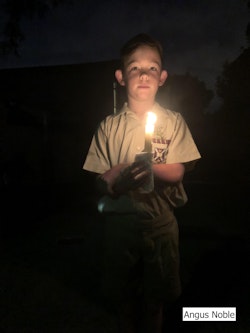


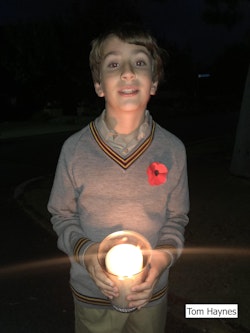
Inquiry Learning
As a member of the International Baccalaureate Primary Years Programme, Scotch College Junior School teaches through guided inquiry approach. Inquiry-based units of work, referred to as 'units of inquiry' or 'UOIs', are the focus for learning in all classrooms. Inquiry may look very different from class to class as both staff and students create unique learning environments though their investigations and specific focus on targeted approaches to learning skills (ATLs). Specialist teachers generally focus more time on the learning skills than the research component of inquiry and they also target the reflection and action stages of the process from the perspective of their learning area. Early years classes (Pre-Kindergarten to Pre-Primary) also differ to the middle and upper primary classes as their level of required support is higher, so ownership and direction of the process is predominantly teacher driven. There are also designated daily literacy and numeracy lessons throughout the Junior School, which focus on specific skills and knowledge students require outside of the units of inquiry. It is considered crucial that students attain these discrete skills in order to ensure full engagement in the higher order thinking skills and concept development found in the units of inquiry.
Regardless of the variations from classroom to classroom, you will see in all classes an increased emphasis on real-life situations, decision-making, problem-solving, research and action.
Our staff work through an inquiry approach which has six stages as shown below:
Tuning In: Exploring, wondering and questioning
Finding out: Experimenting and playing with possibilities, researching and seeking information
Sorting: Collecting data and reporting findings, clarifying existing ideas and reappraising events
Going Further: Deepening understanding through the application of a concept or rule, making and testing theories
Reflection: Making predictions and acting purposefully to see what happens
Action: Elaborating on solutions to problems and actioning these solutions
Mr Warwick Norman
Junior School Dean of Teaching & Learning
We are looking forward to the return of students to school from Monday 4 May and a return to normal teaching and Physical Education. It has been great to see students engaging with the online PE programme, in finishing our gymnastics unit and then the ball skills and skipping challenges that were a part of this. These are skills that all of the students can always work on at home to improve fitness and hand-eye coordination. We will be commencing our ball games skills when boys return to school. For our Year 3 students this will comprise of soccer skills: passing, trapping, dribbling and shooting. The Year 4 students will be working on their hockey skills as we look at similar skills to the Year 3 boys, but with a hockey stick. Our Year 5 students will also be working on their soccer skills. We are all looking forward to the return of the students to school as we move back to face-to-face teaching and instruction.
Mr Scott Whiston
Head of Junior School Physical Education
This will be an article like no other I have written in my lifetime, as it will reflect the adventure that 4T travelled while learning in isolation through the SCOT programme.
As COVID-19 took the world by storm, the atmosphere of the College began to change very quickly. There were whispers and stories and news reports all indicating the arrival of a long-term change in the way the world would operate. Incredibly, the boys of 4T were more than willing to adopt any new protocol asked of them, demonstrating a wisdom and calm beyond their years and showing a profound respect for the efforts of the community to keep everyone on grounds safe and well.
From Monday 30 March, the students of Scotch College were encouraged to work from home and adopt the SCOT programme. I imagine that everyone, including students, parents and staff were somewhat overwhelmed, possibly nervous and slightly anxious at the prospect. Despite the fear of the unknown, the 4T boys and their families jumped on board the 'moving train' and faced their new quest with a curiosity, commitment and excitement that could only be described as magnanimous!
As with all new adventures, there were a few little wrinkles to iron out! Downloading, uploading, emailing, posting, videoing and chatting all became the new norms and demanded netiquette and megabytes not previously needed. I could not have been prouder of the deep respect and high standard of delivery in all forums. Each of you deserve a standing ovation for your performance!
A highlight of the experience was making contact with the boys by phone or video conference. This was a wonderful forum to stay in touch, offer support and see the wonderful learning spaces that each student had created. It was no wonder that the boys were working so successfully given the environments they created to be star students; even at home!
This message is written on the eve of the College opening its doors to the student body once more. Despite the need for continued vigilance in the fight against the pandemic, staff and students alike can't wait to be back together in their rightful learning spaces. So, it is with true gratitude that I extend heartfelt thanks to our 4T family for their efforts to keep themselves safe, keep others safe, and face adversity and challenge with the hearts of warriors.



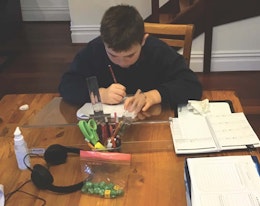
Mrs Rebecca Turkich
Year 4 Teacher

Mr Richard Ledger
Head of Middle School
It was exciting to see and feel the enthusiasm, the joy, the optimism in the air at school today as staff and students alike returned after the extended break. There was certainly a heightened understanding and appreciation of the role relationships and friendships have in the wellbeing and happiness in our lives. There were no high fives, fist bumps or handshakes, but the body language and smiles said it all. The Dalai Lama says it more succinctly than I can:
“We human beings are social beings. We come into the world as the result of others’ actions. We survive here in dependence on others. Whether we like it or not, there is hardly a moment of our lives when we do not benefit from others’ activities. For this reason, it is hardly surprising that most of our happiness arises in the context of our relationships with others.”
The joy of today though is tempered with the realisation that for us to retain the status of being able to interact face-to-face we need to be extra diligent and vigilant about hygiene practices that reduce disease transmission. Whilst COVID-19 is front and centre and demands our attention right now, it will soon be flu season and lessons we have had amplified this past six weeks can hold us in great stead for the coming winter.
There are times such as when watching at the evening news that trying to find the good or the silver lining in something is somewhat of a challenge. One of the great outcomes I have experienced in the past month is the sense of community I have felt and noticed around me. Families with time to ride bikes together, young kids being pushed onto their first waves by mum or dad in the water with them, and dogs being walked everywhere, by everyone! The biggest highlight though has been talking across the verge to neighbours we most frequently just wave at. In the last four weeks we have celebrated a birth, a birthday, a death and Anzac Day as a street family, albeit in groups of less than ten and from at least 1.5m away. I have discovered an opera buff, a Mandarin speaker, a poet and a diehard Dockers supporter who believes this just might be their year, all living around me. Putting the bins out is not just another chore now, it is something to look forward to because of who I might see.
I have also had the importance of trust underlined for me. Trust that the government is giving me the best advice it possibly can at the time, trust in the teleconsult I had to have, trust that when the supermarkets say there will be enough to go around there will be, and trust the people I come in contact with are doing what I am doing; which is everything I can to remain healthy and make good decisions in my area of influence. We are social creatures, no doubt about it, but I cannot think of another more fundamental building block for a community to have than trust in the honest endeavour and integrity of the people within it.
The information and decisions around COVID-19 have and will continue to come at a fast pace as we work through the implications of this pandemic. We are definitely living through an event that will become a reference point in modern history. Thank you for the faith, the trust and the really positive messages you have given us about our school related decisions.
For details of upcoming events, please refer to the online calendar through www.home.scotch.wa.edu.au

Mr Peter Burt
Head of Senior School
It is great to have our Senior School community back on campus in the first step towards our 'normal' practices. I commend our students for the manner in which they have responded to the situation and adapted to the changes - it is a credit to the boys. There were, and will continue to be, challenges, so the need to keep working together, adapting to the circumstances that are presented and supporting each other remains at the forefront of what we do.
I would also like to thank our staff for the manner in which they embraced online teaching and the delivery of the online program to our boys in the last two weeks of Summer Term and the first week of this term. The dedication and commitment to building and delivering the high quality online teaching programme was outstanding. Our Wellbeing programme that started in Mentor groups each morning was very well received by our students and, when looking at the SCOT programme in its entirety and thinking of some of our staff (yes, me included), the phrase "you can't teach an old dog new tricks" could not have been further from the truth.
However, despite being back at school and in a situation that appears to be improving by the day, it is incumbent on all of us to continue to do what we can to ensure the safety and wellbeing of our community. As individuals and as a school we have a responsibility to work within the guidelines and restrictions that currently exist, as we transition back to normality. At school, we all want the return of our Boarding Houses, co-curricular programme, camps, Chapel and Assemblies. To have our Pipe Band, sporting teams, musical production, debating programme and our Moray site up and running will be fantastic, but some will take more time than others and I ask for your patience while we respond as advice is updated. There is nothing we would like more than to have the school fully operational again, but not at the expense of the health and wellbeing of our community.
Thank you to all members of our Scotch College community for your understanding and support during the COVID-19 situation. We look forward to the return of all those activities that complement the Teaching and Learning and Wellbeing programmes of which we are so proud.
The Careers Expo for 2020 that was scheduled to be held at the Perth Convention and Exhibition Centre in May has been cancelled due to COVID-19 public gathering restrictions.
The annual Scotch College Combined Schools Careers Expo scheduled to be held in the Dickinson Centre on Wednesday 10 June 2020 has been cancelled due to COVID-19 public gathering restrictions.
Students and parents are encouraged to visit the UWA website where they can find lots of FAQs with regard to the 2020 application process for students wishing to apply for courses at UWA commencing in 2021: https://www.uwa.edu.au/study/how-to-apply/new-admissions-pathway-for-year-12
The UWA Fogarty Scholarship Program is enriching our community by investing in exceptional young people who use their skills, abilities and commitment to lead positive change in our community, State and nation. There are 10 scholarships on offer to Year 12 WA high school students and each scholarship is valued at $10,000. Applications close in 24 May 2020.
Find out more: http://www.scholarships.uwa.edu.au/futurestudents/uwa-fogarty-foundation/
The Murdoch University After School Program, Term 2 2020, offers Mathematics and Science primers for primary school students aged 10 and over, and will be offered online whilst the current COVID-19 restrictions apply.
Please click here to read the Murdoch Mathematics and Science primers notice.
Monash will be exhibiting in a virtual expo on 7 and 8 May. Students are also able to take virtual tours of Monash Spaces and a number of their Monash Information Evenings are now webinars, so students can register for a session convenient for them.
Information for interstate students wishing to apply to Monash.
Year 12 HUB with information for Year 12 students.
The University Clinical Aptitude Test is a compulsory test that students will have to sit in order to apply for some degrees in the fields of medicine or dentistry. Students thinking of applying to university in 2021 for a degree in one of those fields should check their entry requirements to see if the UCAT is necessary. Registrations will close on 11 May and the tests are taken between 1 and 31 July 2020. It costs $298 to sit the test ($198 concession fee).
To see which Universities require the UCAT ANZ test for applications, to register https://www.ucat.edu.au/ucat-anz/registration-booking/
Due to high demand from teachers, students and parents, the free live Webinar is on again:
5 May 2020, from 6.00pm – 9.00pm (AEST) register here.
The presentation will cover what we know has happened, what might still happen and our advice for students, parents and educators.
To register go to: https://app.livestorm.co/crimson-education/apac-the-impacts-of-covid-19-on-future-us-and-uk-uni-applicants-may-update
With schools and communities still impacted by COVID-19 restrictions, many students have started Term 2 remotely. To help your students continue exploring their career options and opportunities, at school or at home, myfuture has compiled a list of online resources and printable guides to support educators, parents and students during the COVID-19 crisis and beyond.
Education Services Australia (ESA) – the company that manages myfuture – has also put together a range of free online resources for teachers and parents, to help support students' learning and wellbeing during this unprecedented time.
Government websites are also providing education-related COVID-19 updates, learning resources and support, and information for senior secondary students thinking about 2021 university entry is available on tertiary admission centre websites.
Please click here to read the Academic Task Force Master Class and Tuition Class notice.
Mr. Peter Frusher
Careers Advisor
Date |
Event |
Location |
Time |
|
Week 2A |
|||
|
Monday 4 May |
Year 12 ATAR Examination Period commences. Year 12 AAP General classes as per usual and/or ATAR examinations. |
Final day Friday 15 May |
|
|
Year 12 Diploma Examination Period commences |
Final day Tuesday 19 May |
||
|
Week 3B |
|||
|
Tuesday 12 May |
Year 10 Pathway Day (all students) |
Online |
8.30am – 3.25pm |
|
Wednesday 13 May |
Year 9 Study Day (all students) |
|
|
|
|
Year 10 Study Day (all students) |
|
|
|
|
Year 10 Parent Teacher Student Interviews |
WebEx |
9.00am – 3.25pm |
|
|
Year 11 Study Day (all students) |
|
|
|
Thursday 14 May |
Year 11 ATAR Examination Period commences. Year 11 AAP General classes as per usual and/or ATAR examinations |
|
Final day Thursday 28 May |
|
|
Year 11 Diploma classes as per usual |
|
|
|
Week 4A |
|
|
|
|
Monday 18 May |
Thistle |
|

Mr Michael Silbert
President of the OSC
We are currently in a period of transition. We have postponed all our upcoming events, however, the mood is cautiously optimistic. We hope that over the next few weeks we can begin to tentatively reschedule events for the coming months. Of course, each event will be reviewed on a case-by-case basis, depending on the risk assessment of the alumni involved.
While we are unable to connect with our alumni in a physical sense, we are doing our best to connect in other ways. As mentioned in the last Thistle, we delivered a number of care packages to our senior alumni, consisting of food from the scotch College Dining Room and drawings and letters from Junior School students. We have now also worked with Service and Citizenship team to roll out a letter writing programme, connecting Senior School students with a senior OSC. Both of these initiatives have been extremely well-received by all involved; staff, students and alumni alike.
We will soon roll out an initiative to showcase our alumni businesses. We want to try and do our part to ease the burden on those OSCs who may be feeling the pressure due to reduced business. Whether you are a tradie who is following all the protocols, or a cafe who is now moving to a takeaway or delivery service, let us know!
If you have any concerns or queries, or if you want to help out in any way, please do not hesitate to contact the OSC office.